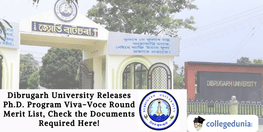Supriya Devchoudhury is the Head of the Department at the NERIM Group of Institutions. She holds a master's degree in Psychology along with a B.Ed. degree. She also has a certificate course in psychological counselling and is a PhD scholar from Assam Don Bosco University. An alumnus of GU, she has ten years of experience in the education sector, along with experience working as a counsellor in a drug addiction centre for three years. Some of her recent publications are “Academic Stress and Personality in Relation to Gender” and “Personality Traits in Relation to Gender: A Study on the Undergraduates,” published in the International Journal of Indian Psychology and India in the 21st Century: Trends in Commerce, Economy, and Society, respectively.

What is the latest program that you are offering in your institute/dept. which will help students outperform and stand apart from the crowd?
Our latest programme in the Department of Applied Psychology is PsychologyPlus. This innovative programme goes beyond traditional psychology by integrating cutting-edge behavioural science, cognitive psychology, and practical skills such as data analysis and communication. By combining in-depth theoretical knowledge with hands-on applications, PsychologyPlus equips students to excel in a wide range of careers. Our aim is to nurture individuals who not only understand human behaviour intricately but also possess the tools to analyse data critically and convey insights effectively.
What are the factors that make this program the best for the students to opt?
The programme we offer, "PsychologyPlus," stands as the prime choice for students due to its comprehensive blend of factors. Firstly, our curriculum is meticulously designed, incorporating the latest advancements in psychology and related fields. This ensures students are exposed to the most current and relevant knowledge. Secondly, our emphasis on practical skills, including data analysis, research methodologies, and communication, equips students with versatile tools applicable across industries.
What will you say the “best practices” in the course you’re offering?
In our Department of Applied Psychology, we uphold a set of "best practises" within our courses that have proven to be instrumental in fostering optimal learning outcomes. First and foremost, we prioritise an interactive learning environment, encouraging open discussions, case analyses, and peer collaborations. This cultivates a rich exchange of ideas and perspectives. Additionally, we emphasise hands-on experience, providing students with real-world projects that bridge theoretical concepts with practical applications. Regular assessments and personalised feedback ensure continuous growth and mastery of the subject matter.
What are some valuable insights of the program that you are offering at your institute/dept.?
Our programme in the Department of Applied Psychology offers a multitude of valuable insights that students find enriching and applicable. One key insight is understanding the intricate interplay between behaviour and environment, which provides a lens to decipher human actions in various contexts. Moreover, the programme delves into the realm of cognitive processes, unveiling how thoughts shape behaviour. Additionally, students gain practical insights by applying psychological principles to real-world scenarios, and honing problem-solving skills.
Check NERIM Group of Institutions Courses & Fees
How does the program ensure that students are being prepared for the future?
Our programme takes a forward-thinking approach to prepare students for the future. We achieve this through a combination of rigorous academic exploration and practical skill-building. By incorporating the latest advancements in behavioural science, technology, and interdisciplinary collaboration, we equip students with a versatile toolkit that is adaptable to the evolving landscape. Additionally, our emphasis on critical thinking, data analysis, and communication hone skills that are increasingly valued in a rapidly changing world.
How did you train yourself/faculty to deliver this program to the students?
Ensuring top-notch programme delivery is a cornerstone of our approach in the Department of Applied Psychology. To prepare our faculty, we conduct intensive training that combines the latest pedagogical methods with the expertise of seasoned practitioners. Workshops, seminars, and collaborative discussions facilitate the integration of cutting-edge research into curriculum design. Faculty members also engage in practical simulations and case studies, ensuring they are well-equipped to bridge theoretical concepts with real-world applications. Moreover, continuous professional development keeps our faculty up to date with emerging trends in psychology and teaching methodologies.
How do you tend to build an industry connected with this program?
Building a robust industry connection for our programme in the Department of Applied Psychology is a priority for us. We accomplish this through several strategic approaches. Guest lectures and workshops conducted by industry experts provide students with insights into real-world applications of psychological principles. Our internship partnerships with diverse organisations offer students hands-on experience, fostering a bridge between academia and industry. We also have collaborative research projects with industry professionals to encourage the exchange of ideas and solutions.
What were the challenges that you faced while inculcating this program in your curriculum?
One significant challenge we faced was ensuring a seamless integration of new content without overwhelming the existing courses. We carefully streamlined the curriculum to maintain a balance between core psychology concepts and the innovative components of the program. Additionally, we faced a challenge in gaining faculty buy-in and preparing them for the new material required intensive training sessions and workshops. Aligning assessment methods to accurately measure the practical skills gained proved to be another challenge, which we tackled through a combination of project-based evaluations and traditional assessments.
What are the types of projects that the students are working on through this program?
Through our programme in the Department of Applied Psychology, students engage in a diverse range of projects that embody the practical essence of the discipline. These projects span from conducting community-based research to assess the impact of psychological interventions to collaborating with local businesses to design strategies that enhance employee well-being and productivity. Students also participate in case studies that involve analysing real-world behavioural challenges and proposing effective solutions.
What are the benefits and career options after pursuing this course?
Our programme in the Department of Applied Psychology offers an array of benefits and opens up exciting career avenues. Graduates gain a deep understanding of human behaviour, making them valuable assets in fields such as human resources, market research, and consumer behaviour analysis. Additionally, their proficiency in data analysis and research equips them for roles in data-driven decision-making and policy analysis. The program's emphasis on practical skills ensures graduates are well-prepared for roles in counselling, clinical psychology, and mental health advocacy.

![NERIM Group of Institutions - [NERIM]](https://image-static.collegedunia.com/public/college_data/images/appImage/1593459187Cover.jpg?h=240&w=1000&mode=crop)
![NERIM Group of Institutions - [NERIM]](https://image-static.collegedunia.com/public/college_data/images/logos/1625290156head.jpg?h=71.7&w=71.7&mode=stretch)
















![Assam Institute of Management - [AIM]](https://image-static.collegedunia.com/public/college_data/images/appImage/17261_AIM_New.png?h=111.44&w=263&mode=stretch)







![Flywayy Institute of Air Hostess Training - [FIAT]](https://image-static.collegedunia.com/public/college_data/images/appImage/undefined?h=111.44&w=263&mode=stretch)

![Third Eye College - [TEC]](https://image-static.collegedunia.com/public/college_data/images/appImage/57585_cvr.png?h=111.44&w=263&mode=stretch)

![MBA/PGDM | admission | 2024 | Narsee Monjee Institute of Management Studies - [NMIMS Deemed to be University]](https://image-static.collegedunia.com/public/college_data/images/logos/1506323004Logo.jpg?h=72&w=72&mode=stretch)




![MBA/PGDM | admission | 2024 | Indian Institute of Management - [IIMC]](https://image-static.collegedunia.com/public/college_data/images/logos/1488950580d2.png?h=72&w=72&mode=stretch)

















.png?h=72&w=72&mode=stretch)




.png?h=72&w=72&mode=stretch)
.png?h=72&w=72&mode=stretch)
.png?h=72&w=72&mode=stretch)
.png?h=72&w=72&mode=stretch)

![Gauhati University - [GU]](https://image-static.collegedunia.com/public/college_data/images/logos/1394864857Gauhati University.png?h=72&w=72&mode=stretch)

![Asian Institute of Management and Technology - [AIMT]](https://image-static.collegedunia.com/public/college_data/images/logos/1588338362aimtlogo.png?h=72&w=72&mode=stretch)



![Girijananda Chowdhury Institute of Management & Technology - [GIMT]](https://image-static.collegedunia.com/public/college_data/images/logos/1714384620Other.png?h=72&w=72&mode=stretch)
![University of Science and Technology - [USTM]](https://image-static.collegedunia.com/public/college_data/images/logos/1421309174University_of_Science_and_Technology,_Meghalaya_seal.jpg?h=72&w=72&mode=stretch)
![Royal Global University - [RGU]](https://image-static.collegedunia.com/public/college_data/images/logos/1744450599download.jpg?h=72&w=72&mode=stretch)

![Assam Don Bosco University - [ADBU]](https://image-static.collegedunia.com/public/college_data/images/logos/1685714174logo.png?h=72&w=72&mode=stretch)

![Assam down town University - [ADTU]](https://image-static.collegedunia.com/public/college_data/images/logos/1714548748adtunewlogo.png?h=72&w=72&mode=stretch)





Comments